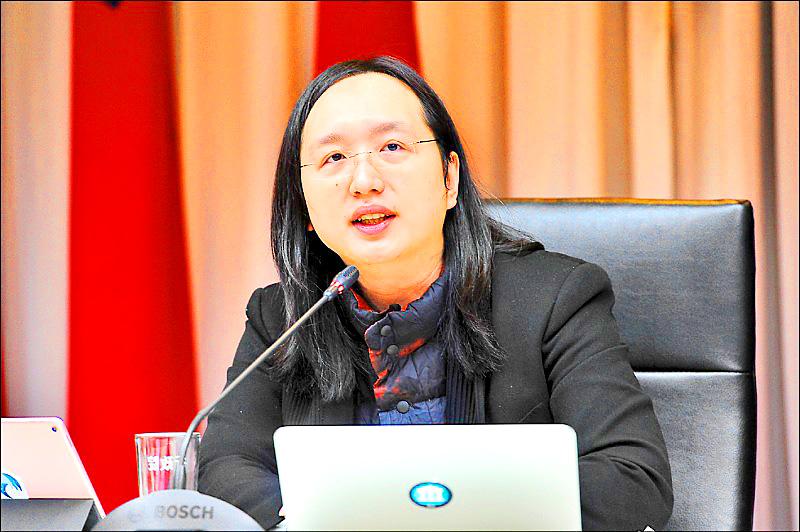A senior South Korean diplomat was summoned to the Ministry of Foreign Affairs in Taipei in protest of Seoul’s last-minute cancelation of a virtual speech that Minister Without Portfolio Audrey Tang (唐鳳) was to make last week.
On Monday, Department of East Asian and Pacific Affairs Deputy Director-General Chang Chun-yu (張均宇) summoned Hong Soon-chang, deputy representative and acting chief of the Korean Mission in Taipei, to lodge an official protest on behalf of the government, ministry spokeswoman Joanne Ou (歐江安) said.
The mission represents South Korean interests in Taiwan in the absence of official diplomatic ties.

Photo: Lu Yi-hsuan, Taipei Times
As Taiwan’s digital minister, Tang was in September invited to speak virtually to the Global Policy Conference on the Fourth Industrial Revolution in Seoul on Thursday, Ou said.
Tang was one of four speakers to speak at an afternoon session on “Social Innovation” during the one-day event, which had in-person and virtual participants.
Tang’s address, titled “Taiwan’s Digital Social Innovation,” focused on how technology can be used to deal with the climate crisis and infectious diseases, Ou said.
However, just a few hours before the event, the organizers informed Tang that her address had been canceled, Ou said.
The organizers said the decision was made after taking into consideration “various aspects of cross-strait issues,” possibly referring to pressure from Beijing over Tang’s invitation, Ou said, citing an e-mail sent to Tang’s office.
The last-minute cancelation was “rude and inappropriate,” Ou said, which was why the ministry summoned Hong.
At the meeting, Hong promised to relay Taiwan’s grievance to his government, Ou added.
Envoy to South Korea Tang Diann-wen (唐殿文) lodged the same protest with the South Korean government in Seoul.
Taiwan, as a sovereign state, can have exchanges with international partners and would do so to enhance its cooperation with other democratic countries, Ou said.
The South Korean Presidential Committee on the Fourth Industrial Revolution, which hosted the conference, says on its Web site that it was set up in 2017 by South Korean President Moon Jae-in.

US President Donald Trump said "it’s up to" Chinese President Xi Jinping (習近平) what China does on Taiwan, but that he would be "very unhappy" with a change in the "status quo," the New York Times said in an interview published yesterday. Xi "considers it to be a part of China, and that’s up to him what he’s going to be doing," Trump told the newspaper on Wednesday. "But I’ve expressed to him that I would be very unhappy if he did that, and I don’t think he’ll do that," he added. "I hope he doesn’t do that." Trump made the comments in

NOT AN OPENING: Trump’s violation of international law does not affect China’s consideration in attacking Taiwan; Beijing lacks capability, not precedent, an official said Taiwanese officials see the US’ capture of the president of Venezuela as a powerful deterrent to Beijing’s aggression and a timely reminder of the US’ ability to defeat militaries equipped with Chinese-made weapons. The strikes that toppled Venezuelan President Nicolas Maduro signaled to authoritarian leaders, including Chinese President Xi Jinping (習近平), US President Donald Trump’s willingness to use military might for international affairs core to US interests, one senior official in Taipei’s security circle said. That reassured Taiwan, the person said. Taipei has also dismissed the idea that Trump’s apparent violation of international law could embolden Beijing, said the official, who was not

A cold surge advisory was today issued for 18 cities and counties across Taiwan, with temperatures of below 10°C forecast during the day and into tonight, the Central Weather Administration (CWA) said. New Taipei City, Taipei, Taoyuan and Hsinchu, Miaoli and Yilan counties are expected to experience sustained temperatures of 10°C or lower, the CWA said. Temperatures are likely to temporarily drop below 10°C in most other areas, except Taitung, Pingtung, Penghu and Lienchiang (Matsu) counties, CWA data showed. The cold weather is being caused by a strong continental cold air mass, combined with radiative cooling, a process in which heat escapes from

Snow this morning fell on Alishan for the first time in seven years, as a strong continental cold air mass sent temperatures plunging across Taiwan, the Central Weather Administration (CWA) said. The Alishan weather station, located at an elevation of about 2,200m in central Taiwan, recorded snowfall from 8:55am to 9:15am, when the temperature dropped to about 1°C, the CWA said. With increased moisture and low temperatures in the high-altitude Alishan area, the conditions were favorable for snow, CWA forecaster Tsai Yi-chi (蔡伊其) said. The last time snow fell at the Alishan weather station was on Jan. 10, 2018, while graupel fell there